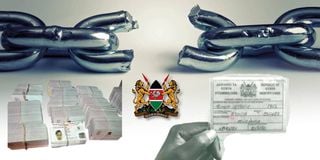Broken system: Inside Kenya’s ID crisis

About 200,000 Kenyans apply for IDs per month, meaning the number of pending applications could hit 1 million by end of next month, if the legal impasse is not resolved.
What you need to know:
- Applications for new identity cards have piled up to more than 600,000 in the past two-and-a-half months, with the number going up by 10,000 every day.
- The ID crisis has stopped the Police, National Intelligence Service, Kenya Defence Forces and all other state institutions that employ new staff on a continuous basis from recruiting.
About 200,000 Kenyans apply for IDs per month, meaning the number of pending applications could hit 1 million by end of next month, if the legal impasse is not resolved.
The lives of more than half a million Kenyans who turned 18 years after mid-November are at a standstill. They cannot register for a new mobile phone Sim card, open a bank account or even access the Higher Education Loans Board (Helb) funding, for those waiting to join university and other tertiary learning institutions.
The specialised security printer machines that produced the second-generation ID cards for nearly one-and-a-half-decade were switched off on November 14, 2023, but a court order stopping the printing of third-generation IDs was issued shortly thereafter, halting a process that has routinely assigned legal identity to Kenyans since 1915, during the colonial era.
Applications for new identity cards (IDs) have piled up to more than 600,000 in the past two-and-a-half months, with the number going up by 10,000 every day. An additional 5,000 Kenyans apply for replacement of lost or defaced IDs every day.
In this second edition of the “Broken Government Services” series, Nation Media Group journalists interviewed state officials as well as ordinary Kenyans affected by the unfolding crisis, painting a picture of a dysfunctional system that is frustrating its own citizens.
The ID crisis has stopped the Police, National Intelligence Service, Kenya Defence Forces and all other state institutions that employ new staff on a continuous basis from recruiting.
The young adults as well as those with damaged or lost IDs cannot take jobs in the private sector, as the document is needed for opening of a Kenya Revenue Authority (KRA) personal identification number (PIN) that is mandatory in processing of payroll taxes.
Also read:
If arrested by the police for whatever reason, they cannot post bail since an ID is required for processing and court records. Those that fall ill and need specialised treatment abroad cannot get it, the application for a travel passport requires one to have an ID card.
“It is a big crisis, so many Kenyans are affected and the number is growing bigger by the day, their lives are at a standstill,” said a senior official familiar with the deepening crisis.
The battle over rollout of the third-generation IDs is playing out in court, and Ministry of Interior and National Administration officials say they cannot comment on the ongoing litigation to avoid falling afoul of sub judice rules, which bar public discussion of matters under judicial consideration.
The court case filed by Katiba Institute is set for mention tomorrow, February 6.
About 200,000 Kenyans apply for IDs per month, meaning the number of pending applications could hit 1 million by end of next month, if the legal impasse is not resolved.
The possibility of reverting to the second-generation identity cards pending determination of the case appears remote, given that the supplies and printing contract had lapsed.
High Court Judge, John Chigiti, on December 5 2023 issued an ex-parte order stopping the printing of third generation IDs, otherwise known as Maisha Card.
Katiba Institute argued that the state lacked a legal basis to issue the new IDs, did not conduct a proper data protection impact assessment and meaningful public participation before rollout of the Maisha Card.
“I find that the application is not frivolous or vexatious. It raises an arguable case that should be heard and determined on merit within the Fair Administrative Action Act framework,” Justice Chigiti observed.
The civil society lobby told the court that issuance of Maisha Namba requires Kenyans to provide sensitive biographical information and biometric data before conducting a data protection impact assessment as required by section 31 of the Data Protection Act.
The government however argues that the order was issued ex-parte, without affording the state a chance to outline the far-reaching implications of the ruling, which has created the current crisis. It argues that the Maisha Cards are an improvement on the security and utility features, but do not require collection of any new data that was not required for issuance of the second-generation IDs.
The third-generation IDs have inbuilt digital chips that store the holder’s information. They are also International Civil Aviation Organisation (Icao) compliant, meaning they can be used for international travel within specific geographical regions.
Contracts for printing of security documents such as IDs, passports and driving licenses involve multi-billion shilling tenders that are hotly contested, often attracting multiple lawsuits.
Part of the documents filed in court indicate that it would take at least six months to re-start the machinery and supply infrastructure for printing second-generation IDs, currently being phased out.
As per the Public Procurement and Asset Disposal Act 2015, the state would have to float a fresh tender, which takes a minimum of 14 days.
Evaluation of tenders takes about 30 days, notification of award to successful bidder 14 days before the contract is signed, assuming that it is not challenged in court.
The contract vendor is then given 4 months to deliver printing materials into the country, which includes a period for pre-fabrication to required Kenyan standards and customs clearance at entry points.
Setting up and testing the equipment would then require another two months, indicating that the delays could last up to September if the current court order is not lifted.





